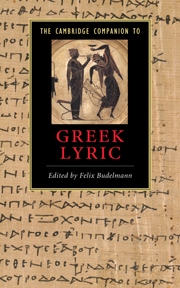Book contents
- Frontmatter
- Introducing Greek lyric
- Part I: Contexts and topics
- 1 Genre, occasion and performance
- 2 Greek lyric and the politics and sociologies of archaic and classical Greek communities
- 3 Greek lyric and gender
- 4 Greek lyric and the place of humans in the world
- 5 Greek lyric and early Greek literary history
- 6 Language and pragmatics
- 7 Metre and music
- Part II: Poets and traditions
- Part III: Reception
- Chronology of select melic, elegiac and iambic poets
- Further Reading
- Glossary
- List of works cited
- Index
7 - Metre and music
from Part I: - Contexts and topics
Published online by Cambridge University Press: 28 May 2010
- Frontmatter
- Introducing Greek lyric
- Part I: Contexts and topics
- 1 Genre, occasion and performance
- 2 Greek lyric and the politics and sociologies of archaic and classical Greek communities
- 3 Greek lyric and gender
- 4 Greek lyric and the place of humans in the world
- 5 Greek lyric and early Greek literary history
- 6 Language and pragmatics
- 7 Metre and music
- Part II: Poets and traditions
- Part III: Reception
- Chronology of select melic, elegiac and iambic poets
- Further Reading
- Glossary
- List of works cited
- Index
Summary
Metre
Greek metre
Greek metre is simple. All metrical structures are built out of two bricks, short and long syllables, combined in a variety of simple, yet imaginative ways. Knowing Greek metre is indispensable. It is essential for understanding origins, genre, performance conditions, literary allusions and overall meaning in Greek poetry. It also gives fascinating glimpses of what came before Greek poetry. This chapter is designed to describe the most important types of metre used in Greek lyric, showing their interaction and their development. The presentation is meant to be accessible even to students with no prior knowledge of Greek metre.
The basics
A knowledge of Greek prosody (the study of the sound of a language, especially speech rhythm and its relationship to versification) is necessary for scanning poetry. The basic rules are as follows. When we scan a line of Greek verse, we must ignore word division and regard all words as joined together.
- Type
- Chapter
- Information
- The Cambridge Companion to Greek Lyric , pp. 130 - 146Publisher: Cambridge University PressPrint publication year: 2009
- 3
- Cited by

